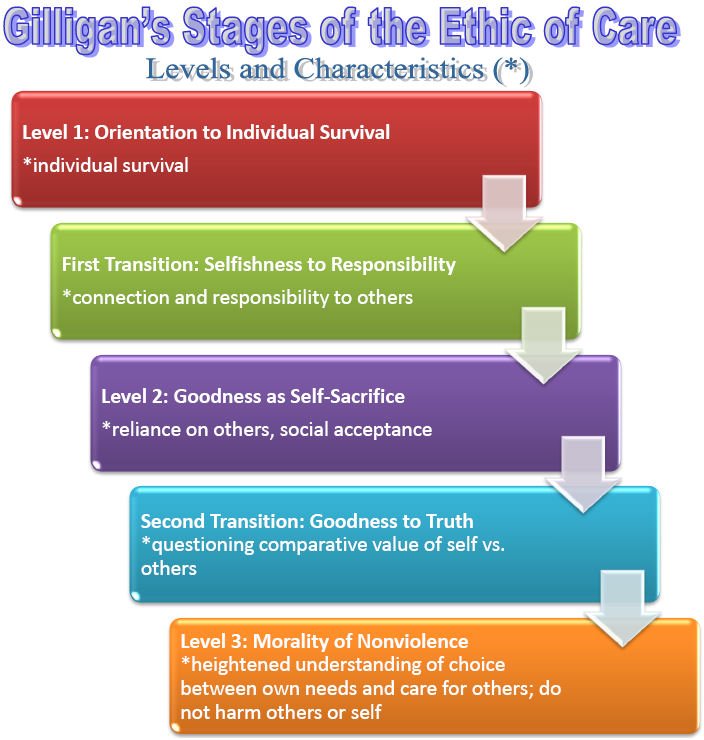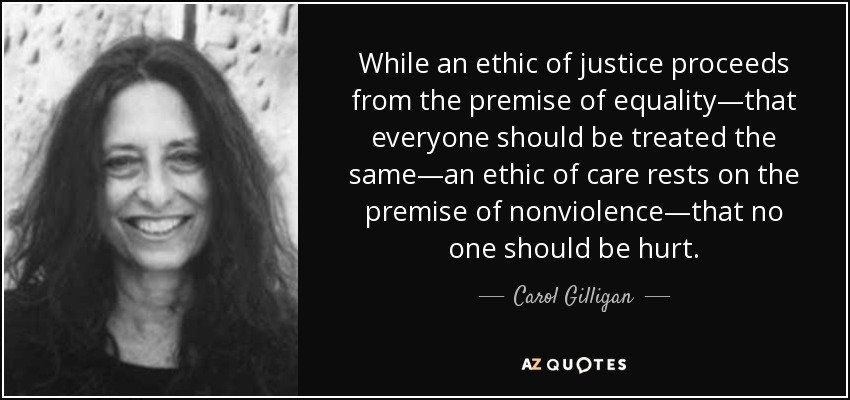CAROL GILLIGAN AND THE BOOK THAT LISTENED TO GIRLS
HARVARD — 1960S — It was a massive study. Asking, probing, analyzing, the psychologist followed 84 children over 20 years. His conclusions were “important.” From the toddler’s cry of “mine!” to the higher justice of Gandhi, there are six stages of moral development, Lawrence Kohlberg declared. Few adults move beyond stage four — what the law says is right! And fewer women than men reach that stage. Ahem!
Kohlberg’s stages were all but enshrined in every school in the land. Too bad about women, though. Hadn’t Freud said, “for women the level of what is ethically normal is different from what it is in men”? Then Kohlberg’s assistant spoke up. Um, didn’t anyone notice? Those 84 kids? They were all boys. Might girls speak “in a different voice?”
When Carol Gilligan began her career, gender studies was in utero. Gilligan did not expect to publish more than a paper in a psych journal. She had three sons to raise plus her teaching at Harvard. But it was 1975, the United Nations’ International Year of the Woman. Books about women were topping best-seller lists. Something was in the air, something more than following every “he” with a quick “or she!”
In a Different Voice remains one of those rare books that opened entirely new roads. For the first time, a psychologist studied how girls — just girls — think. And they do not always think like boys. Consider Amy and Jake.
Lawrence Kohlberg asked boys to solve a moral dilemma. Heinz’s wife is dying and he can’t afford the drugs that would save her. Would it be moral for Heinz to steal the drugs?
Jake, reasoning that “a human life is worth more than money,” says yes. But when asked by Carol Gilligan, Amy said no. If Heinz steals the drug, Amy told Gilligan, he’d save his wife, all right. But then he’d be in jail and wouldn’t be able to care for her. She might die anyway. So maybe he could borrow the money? Or talk it over with the druggist? And they could “reach something besides stealing?”
For Gilligan, Amy and Jake were not just kids climbing a moral ladder. They were archetypes. Jake embodied the “ethics of judgment” — isolated, rigid, either/or. Amy embodied the “ethics of care” — relational, fluid, empathic. Might these contrasts explain a few things about our world?
Gilligan avoided a preference for either ethic. She cautioned, on page 2, against using her findings in a battle of the sexes. “The different voice I describe is characterized not by gender but theme. Its association with women is an empirical observation and it is primarily through women’s voices that I trace its development. But this association is not absolute. . . In tracing development, I point to the interplay of these voices within each sex.”
Still, In a Different Voice touched several nerves. Released in 1982, the book sold 700,000 copies in 16 languages. Teachers who had been taught Kohlberg’s six stages began to listen more carefully to girls. Women’s studies departments made the book required reading. Gilligan went on to teach at several universities, to chair Harvard’s first Gender Studies program, and most recently to publish a novel and write an opera.
“An ethic of care rests on the premise of nonviolence — that no one should be hurt.”
With time, however, critics pounced. Psychologists questioned Gilligan’s methodology, finding her results hard to replicate or verify. Gilligan wasn’t surprised. She based her conclusions on interviews, not statistical surveys, and never wanted her ideas set in stone. “I thought of the book as the opening of a conversation,” she said, “certainly not the close of one.”
Decades later, the conversation continues. In a Different Voice, still controversial, is still widely read. Gilligan’s work inspired the federal Gender Equity in Education Act, but it also inspired girls — and women — to value their voices.
One psychologist who challenged Gilligan’s methodology acknowledged her as “a major intellectual contributor at the time. She’s like Freud. Today his ideas have less credibility, and we don’t use them so much in scientific psychology.” But in 1982, Carol Gilligan made “a revolutionary step forward.” She listened.










